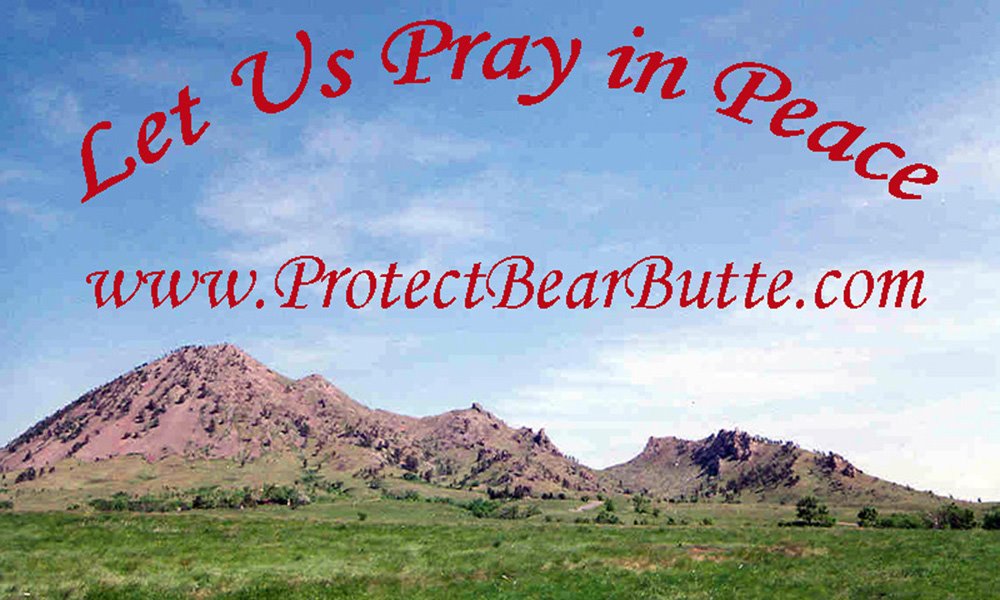Column: McCain policy should uphold Native religious freedoms, sites - Wednesday, August 6, 2008
By JODI RAVE of the Missoulian
“I believe the federal government has a special ethical and legal responsibility to help make the American Dream accessible to Native Americans.”
- John McCain, Native policy statement
It's with some irony that Sen. John McCain has touted the federal government's “ethical and legal responsibility” to help Native people live the American Dream, a statement that smacked against the backdrop of the sacred Bear Butte as McCain paid tribute Monday to veterans attending a nearby biker rally.
While McCain has a strong record of championing Native causes, his legislative coups don't reflect the need to protect sacred sites and indigenous people's religious freedom.
McCain, the presumptive Republican presidential nominee, spoke to several thousand motorcycle enthusiasts at an annual tribute to military men and women attending the Sturgis Rally, the country's largest biker extravaganza. He greeted the crowd at the Buffalo Chip Campground, about four miles south of Mato Paha, a sacred butte rising 1,253 feet from the surrounding prairie.
Traffic to the campground was backed up for hours Monday night as people drove to the rough-and-rowdy, leather-and often-barely-clad venue for the night's headliners, featuring motorcycle stunts, Kid Rock, female wrestlers, the Miss Buffalo Chip Beauty Pageant - and McCain.
“I find it strange that he would come to a venue such as the Sturgis Rally that is very well known for nudity and drunkenness,” said Tamra Brennan, founder and director of Protect Sacred Sites.
“I understand he was there to honor the veterans, but it seems there's a lot of other ways he could have honored veterans.
“And why didn't he come into Indian Country while he was here?” she said. “During the campaign process, he didn't come to any of the reservations like the other candidates did and talk to people about Indian issues.”
Brennan, who lives at the base of Bear Butte, is among Native sacred site advocates campaigning to protect Bear Butte from continual encroachment, mostly by big biker bars within eye- and ear-shot of the ceremonial mountain, a religious area in the foothills of the Lakota Nation's revered Black Hills.
In the campaign quote from his Native policy statement, McCain acknowledges the U.S. government's responsibility to help Native people live the American Dream.
While Natives and non-Natives' idea of the American Dream may vary, they share a dream for religious freedom.
Even though the United States has a history of using its military might to strip Native people of their religious freedoms, other world leaders acknowledge a need to restore what's been lost.
In 2007, the United Nations adopted the Declaration on the Rights of Indigenous Peoples, which states indigenous people have “the right to maintain, protect, and have access in privacy to their religious and cultural sites �”
The Arizona senator's 25-year legislative record shows he knows Native people are far from living the American Dream.
McCain has twice been chairman - and remains a member - of the Senate Committee on Indian Affairs. The leadership position has given him keen insight into the needs of tribal communities, allowing him to sponsor and enact legislation to improve the lives of Native people. He sponsored the Tribal Self-Governance Act of 1994, a law to strengthen Indian self-determination and allow for government-to-government relations.
He has also championed legislation to support law enforcement, health care, trust resources, economic development, housing and education initiatives throughout Indian Country.
“As chairman of the Senate Committee on Indian Affairs and in his home state of Arizona, Senator McCain has long been a leader on issues important to Native Americans,” Tom Steward, regional campaign director, said Monday. “Senator McCain's speech in Sturgis is to honor current military members and veterans who have paid the ultimate sacrifice for our freedoms, including Native Americans.”
Native people, indeed, have made the ultimate sacrifices to maintain any semblance of freedom.
They were forced to surrender tens of millions of acres of homelands, including Bear Butte, which has remained central to prayers and ceremonies. Indigenous people of North America have the religious distinction of embracing nature as a church. Their holy altars are laid upon natural landscapes, including prayer and fasting sites spread across the slopes of Mato Paha.
Indigenous people from more than 30 tribes visit the butte throughout the year, mostly in the summer months. Their peaceful prayers and vision quests often clash with fireworks and music blasting from nearby Sturgis venues, such as the one visited by McCain.
The presidential candidate's Native policy statement doesn't make a pledge to protect the religious freedom and sacred sites of Native people.
But if he is to continue touting the federal government's ethical and legal responsibility to helping Native people live the American Dream, he can start by upholding their religious freedoms.
Jodi Rave covers Native issues for Lee Enterprises. Reach her at (800) 366-7186 or at jodi.rave@lee.net.
http://www.missoulian.com/articles/2008/08/06/jodirave/rave40.txt
In peace & solidarity,
Tamra Brennan
Founder/Director
Protect Sacred Sites Indigenous People, One Nation
www.protectsacredsites.org
www.protectbearbutte.com
"Our sacred lands are all that remain keeping us connected to our place on Mother Earth, to our spirituality, our heritage and our lands; what’s left of them. If they take it all away, what will remain except a vague memory of a past so forgotten?"
Thursday, August 7, 2008
Subscribe to:
Post Comments (Atom)




No comments:
Post a Comment